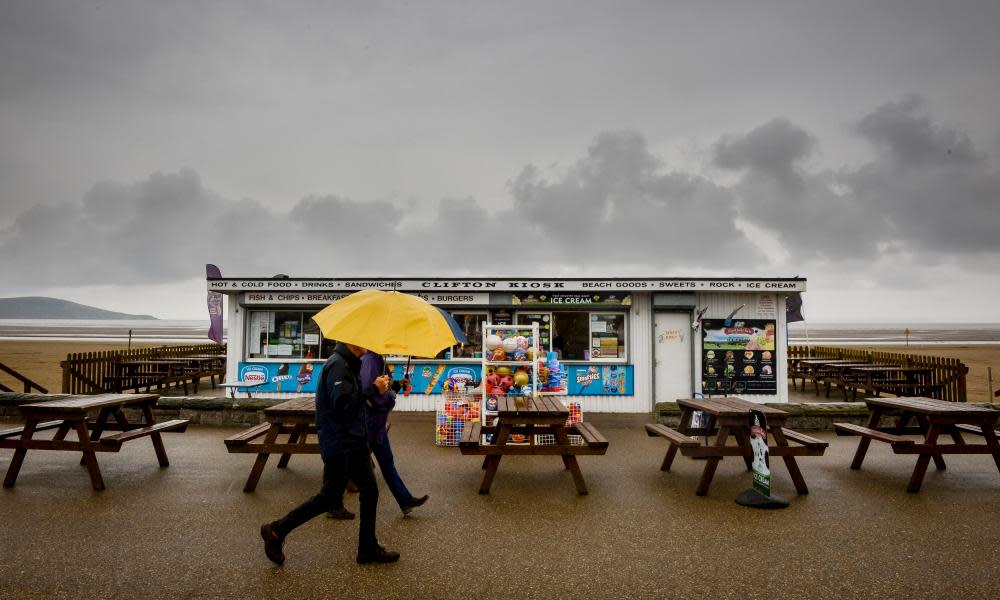Extra bank holidays mean little to today’s insecure workforce – but they should

They are days set aside for idleness and tourists. Dust swirls where, during a weekday, traffic normally would; visitors trundle their cases past shopfronts and cafes that would normally be open. Buses run sporadically. Trains not to anywhere important. This is the British bank holiday: always stuck at the end of a weekend to make it “long”; always a welcome break from work; always promising more than it can deliver.
So Jeremy Corbyn’s offer to give the UK four extra bank holidays is both a boon and a challenge. For Britain’s ultra-flexible private sector workforce there is no right to a paid holiday on Easter Monday or Boxing Day. Whitehall may down tools for Maundy Thursday but not the local chicken shop. Nor do many private sector workers get any extra payments for working a bank holiday. That’s why, on social media, some low-paid workers immediately voiced the fear that, by giving them an extra holiday, Labour was actually offering them a pay cut.
This headline-grabbing promise actually poses a much bigger question than it answers – namely, how should governments help us to balance work and life intelligently, and who should pay?
In the US, one of the trade unions’ most popular catchphrases is: “We’re the folks who brought you the weekend.” Labour movements across the world were formed in the struggle for 10- and then eight-hour days, and five-day weeks. Then, for 100 years, progress seemed to stop. Trade unionism, Marxism and social democracy were after all, as the French thinker André Gorz called them, “utopias based on on work”.
A few ritually timed Mondays off, during which, traditionally, your local football or rugby teams staged a derby and everybody got drunk, or went to the races – these were OK. But the idea of progressively eroding the work-week to four days, maybe three, so you reach a tipping point where leisure becomes the predominant activity of adults, never caught on among the left.
And the reason is obvious if you look at the glum faces of people wandering aimlessly around the deserted streets of suburbia on Easter Monday. Work is interesting. Work defines us. It invades our leisure time, creeps on to our iPad while we are supposed to be eating a takeaway or watching TV – because it brings a calculable financial reward and because, in our hearts, we secretly want it to.
And we do it even sometimes without wages. The TUC calculates that UK workers contribute more than two billion hours of free work every year to their employers, by doing unpaid overtime. The epicentre of this explosion of generosity is the middle-management stratum and teachers. All told, employers gain an annual £33bn from unpaid work, the union body says.
The paradox is that we stand on the brink of an era of automation. Not just robots and self-driving cars, but the deployment of artificial intelligence to create systems from scratch that don’t need human labour.
You can see the advance signs of this change in the emergence of the “precariat” – systemically under-employed, low-waged and insecure workers; a generation who have known nothing other than total employer power, and total employee powerlessness. This generation understands that the slightest extension of employment rights to their workplace would destroy its business model and close it down.
The other advanced signal is the “third space” created by coffee-bar culture; by new public social spaces designed to frame face-to-face networking and “chilling out”. The point about sitting in the Carluccio’s at Birmingham New Street, watching the commuters rush past below, is that you – with your headphones and MacBook – are already at work (on your novel, your spreadsheet, your project management course). And yet you are also physically on show to your peers, drinking expensive coffee. And you are doing Snapchat. For many people, techno-capitalism is aggressively blurring work and life. Yet in the long run it poses the question: how are we going to make the transition to a low-work society?
A large part of the answer has to be to de-link work from wages. Though there has been a big focus on the idea of a basic income paid out of taxation, making all bank holidays – including Corbyn’s extra four – statutory paid time off work would be a good start.
If all employees had 12 days guaranteed paid holiday a year (where you can swap your bank holiday for a different day) – from the civil servant to the chicken fryer –, that would begin a non-trivial change to our work culture. Instead of trying to do cost/benefit analysis on lost wages versus increased leisure spend, Labour should make clear: the cost is borne by employers.
But you also have to – pro-actively – create the spaces and opportunities for people’s leisure time to be more interesting. All the libraries we have shuttered, the public spaces we have enclosed; all the office doorways where people can no longer smoke, all the pubs where they can no longer sit down or hear each other speak – need to be replaced by something.
If we win the fight for more paid leisure time, then the creation of new public spaces – from theatre foyers to parks to gyms, cafes, beaches – needs to become a social technology, not just an afterthought of planning or architecture.
When Robert Graves and Alan Hodge wrote a social history of the inter-war period, they titled it The Long Week-End, partly in order to evoke the boredom and irrelevance that many people experience when Sunday extends into Monday.
For the rich, the “long weekend” has almost always meant doing something gratifying, somewhere opulent. So public policy should do more than give us extra long weekends. It should mandate that we are paid for them, and that our towns and cities become places we would like to spend them.

 Yahoo News
Yahoo News 
